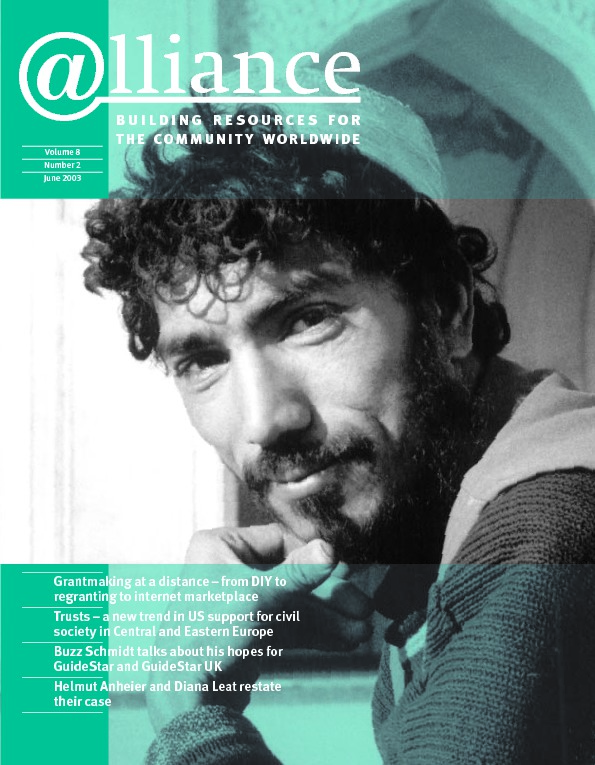Through their programmes in the South, UK NGOs have long been at the forefront of efforts to achieve the MDGs. More recently, however, it is their advocacy role that has come to the fore. While these NGOs may not have vast resources themselves, they can be influential in leveraging them.
Goal 8, which outlines a global partnership for development in which rich countries are responsible for creating the conditions for the other goals to be fulfilled – by providing more aid, fairer trade and deeper debt cancellation – has been a particular focus of their attention. BOND, a network of over 290 British-based NGOs active in international development, plays an increasingly important role in advocating for policy and practice change that is conducive to achieving the Goals.
BOND’s diverse membership collaborates on common issues through thematic working groups which raise awareness, undertake collective advocacy, and act as sources of advice and capacity-building in their specialist area for others in the network. BOND plays a key role in representing the views and interests of the UK NGO sector to the UK government and international institutions such as the European Union. It attempts, through its strength as a network, to ensure that the UK government takes into account NGOs’ views and concerns, and lobbies it to fulfil its international commitments and improve its policies towards poverty eradication. Central to this is the recognition that addressing the structural issues that underlie poverty is crucial to achieving the MDGs.
The UK government’s recent announcement, for instance, that it will no longer impose economic conditionalities on developing countries in return for aid is the result of long-standing and coordinated lobbying by UK NGOs and their southern partners, in which BOND was also influential. NGO pressure exposed the harmful effects of imposed privatization, deregulation and liberalization. Concerted, collective pressure can have real impact.
BOND and the EU
As the world’s largest multilateral donor and trading block, the EU has a crucial role to play in the fight against poverty. During the UK’s presidency of the EU, BOND will press the British government to take the lead in shaping an EU development agenda that will help achieve the MDGs – delivering more poverty-focused development assistance, ensuring a pro-poor trade regime, fostering human security by addressing the needs of fragile states, championing an International Arms Treaty and strengthening regulations for European corporate investment. BOND’s manifesto, Europe’s role in making poverty history, sets out a programme of action for the UK Government and EU Member States.
Lobbying on aid
BOND will also continue to call for the more generous and effective aid that is one of the cornerstones of the MDGs. In the UK, following a campaign by the BOND network, the government announced in 2004 that UK aid would rise to 0.47 per cent of national income by 2007-08 and reach 0.7 per cent by 2013. BOND still sees this campaign as only a qualified success, however, with calls for the UK to reach 0.7 per cent earlier going unheeded. BOND’s leadership will be important in ensuring that the sector keeps pressing the government to do more, and do it sooner.
A similar EU campaign recently culminated in the announcement by EU Ministers of a new collective target of 0.56 per cent of GNI for aid by 2010 and 0.7 per cent by 2015. BOND, as a member of CONCORD, the European confederation of development NGOs, has joined in EU-wide lobbying of national Development and Foreign Ministers. A media event, organized under the umbrella of the Global Call to Action against Poverty, aimed to put pressure on those countries reluctant to commit to 0.7 per cent. Development Ministers from several EU Member States that had already reached 0.7 per cent or had a timetable for doing so signed a large 0.7 per cent white banner, sending out a clear message to fellow Member States on the need to increase aid.
BOND is one of the core networks of the MAKEPOVERTYHISTORY campaign. Whatever the effect of this campaign, it is clear that its scope will have a lasting impact on the way the development NGO sector relates to other stakeholders, from trade unions to faith-based organizations, from youth groups to local voluntary organizations and southern networks and activists. The need for civil society to join forces globally for a louder collective voice and to create a tradition of public support for pro-poor development has never been clearer. And the need for BOND and similar organizations to orchestrate that collective voice has never been greater.
>
Giorgiana Rosa is Policy Officer at BOND. She can be contacted at grosa@bond.org.uk






Comments (0)